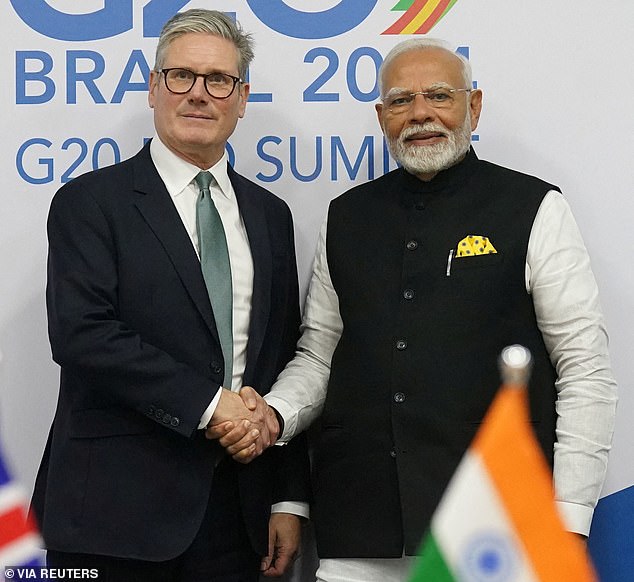Indian nationals accounted for the highest proportion of work visas issued to people applying to come to the UK last year – amid claims Sir Keir Starmer is favouring them over British workers by introducing a ‘two-tier’ tax system.
Under the terms of a new £5billion trade deal with New Delhi, tens of thousands of temporary Indian workers will be exempt from paying national insurance in Britain, making them cheaper to hire.
India heralded the change as an ‘unprecedented’ win but the Prime Minister was accused of undercutting British workers after NI contributions for UK firms were increased at last year’s Budget, with many warning they be will forced to slash jobs or even shut down.
A total of 81,463 work-related visas were issued to Indians in 2024, meaning they accounted for 22 per cent of all those issued.
Some of them will now benefit from a tax break after Labour gave in to an Indian demand that workers and companies should not pay NI contributions on staff brought in to work in the UK if they are in the country for less than three years.
The policy, which will also apply to British workers in India, was justified on the basis that short-term employees should not have to contribute to social security provisions that they will not benefit from.
But Kemi Badenoch and Nigel Farage have both dubbed the Government’s differing policies on National Insurance a ‘two-tier’ approach and insisted it will make British workers less attractive.
Of the 81,463 Indian nationals who were granted a work visa last year, 34,954 (43 per cent) were classed as main applicants and 46,509 (57 per cent) were classed as dependants, or immediate family members.

Sir Keir Starmer shaking hands with India’s Prime Minister Narendra Modi on the sidelines of the G20 summit in Rio last year
The most common categories of work visa issued to Indians in 2024 were the health and care worker visa (30,301 out of 81,463, or 37%) and the skilled worker visa (27,922 or 34%).
Among the smaller categories were senior or specialist business workers (6,219 nationals), creative workers (1,860), international sportspeople (241), religious workers (148), seasonal workers (101) and religious ministers (70).
The total number of work visas issued to Indian nationals has halved year-on-year, from 162,655 in 2023 to 81,463 in 2024 (a drop of 50 per cent).
This is likely to reflect changes in legal migration rules introduced in early 2024 by the previous Conservative government, including a ban on overseas care workers bringing family dependants, and a steep rise in the salary threshold for skilled workers to £38,700.
The number of main applicants from India granted work visas fell 53 per cent year-on-year, while the number of dependants dropped 48 per cent.
A separate 419,312 study visas were issued by the UK in 2024, of which 92,355 (22%) were for Indian nationals – the second highest proportion after China (103,561 or 25%).
Almost all of the 92,355 visas were for main applicants: 88,909, or 96%.
The remaining 3,446 (4%) were for dependants.
International students cannot apply for a study visa unless they have an unconditional offer of a place on a course with a licensed student sponsor, such as a school, college or university.
The total number of study visas issued to Indian nationals has dropped year-on-year, from 159,371 in 2023 to 92,355 in 2024: a decrease of 42%.
This is again likely to reflect changes in migration rules implemented at the start of 2024, which stopped students bringing family members to the UK apart from those doing postgraduate research courses or on government-funded scholarships.
While the number of main applicants on study visas from India has fallen by 26%, from 119,970 in 2023 to 88,909 in 2024, the number of dependants is down by 91%, from 39,401 to 3,446.
The trade deal agreement said there would be more visas for yoga teachers as they were now classed as ‘skilled workers’, alongside chefs and musicians, capped at 1,800 a year.
The row over NI comes just days after Labour were battered in the local elections by voters who turned to Reform UK over concerns about immigration.
Conservative leader Ms Badenoch refused to agree to the deal when she was trade secretary over concerns about visas and fairness.
‘This is two-tier taxes from two-tier Keir,’ she said. ‘When Labour negotiates Britain loses.’
The agreement will mean that Indian workers who are transferred to the UK offices of their employers will be exempt from NI for the first three years.
Their firm, if they are Indian owned or a multi-national with offices in the country, will also not have to pay the contributions. The deal will be reciprocal for British workers who are transferred to workplaces in India.
Officials have not provided an assessment of the cost or impact on UK businesses.
The change is understood to have been a key demand by New Delhi’s negotiators who said the agreement, which has been three years in the making, will result in ‘significant financial gains’ for Indian companies.
Terms of the trade deal will also see the UK lower tariffs on clothes, shoes and food such as frozen prawns from the subcontinent, in exchange for reciprocal cuts for products including whisky and cars.
But the tax break – which was omitted from the UK press release on the pact – immediately provoked anger.
Grim figures yesterday revealed the UK’s services sector had shrunk for the first time in 18 months with the NI increase, which came into force in April, blamed alongside Donald Trump’s trade war.
Tory shadow business minister Dame Harriett Baldwin told the Commons: ‘This Government is literally putting up taxes for British workers, but cutting them for Indian workers. This deal looks like it’s subsidising Indian labour while undercutting British workers.’

Tory leader Kemi Badenoch – seen visiting a school in London yesterday – has accused Sir Keir Starmer of a ‘two-tier’ approach
And shadow justice secretary Robert Jenrick wrote on X: ‘British workers come last in Starmer’s Britain.’
Writing in today’s Mail, Nigel Farage, fresh from delivering Labour a bloody nose at last week’s local elections, said: ‘In Starmer’s Britain, people who have grown up here, worked hard, paid their taxes and propped up the economy are effectively being asked to pay to put themselves out of work.
‘It is nothing short of a betrayal of working people in this country.
‘After this deal it will become 20 per cent cheaper to employ an Indian worker over a British one.’
Defending the deal, Business Secretary Jonathan Reynolds pointed to equivalent agreements with the EU, the US and South Korea under the Double Contribution Convention.
‘It means that when our people are moved by a company to India they will be paying into the UK system and not the Indian system, and when Indian people are temporarily in the UK they’ll be paying into their system and not to ours,’ he said.
‘But it’s very specific as to who this applies to and if people were in the UK they would still be paying income tax, they would still be paying, for instance, the health surcharge and they wouldn’t be eligible for benefits from the national insurance system.’
But Tory MP Nick Timothy said that ministers were ‘conning’ the public.
‘These changes will create a massive incentive for UK firms to work with Indian service providers, undercutting domestic workers, companies and contractors,’ he said.












